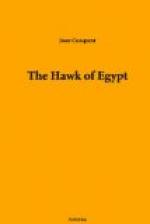And then, just as on the far horizon there showed a mound which might have been a hillock of sand or a verdant patch, outcome of precious water, or a slowly-moving caravan of heavily-laden camel, the mare Pi-Kay increased her pace. You would not have noticed it, for it would have seemed to you that she was already all out; but you would—as did Damaris—if you knew anything about horses, have felt it, had you been riding her. It was that last grain of the last ounce by which races are won; the supreme effort of the great sporting instinct, which lies in all thoroughbreds, human or animal; and Damaris, thrilled to the innermost part of her being as she sensed rather than felt the quiver which passed through the mare, leant forward and touched the satin neck.
That which distance had given the appearance of a mound grew more and more distinct. It was no mound nor hillock, verdant patch nor slowly-moving caravan of camel.
Three tents showed at last distinctly, and the following is the short explanation of their origin.
As it is not good for the Oriental youth to stay under the same roof as his mother, once he has come to man’s estate—which is at any age after eleven in the lands of intense sun—the building of the House ’an Mahabbha near the Oasis of Khargegh had been begun within the first year of the birth of Hugh Carden Ali.
Owing to the entreaties of his English mother, the boy had not been affianced in extreme youth to a little maid of two or three or four summers, upon whom he would not have set eyes until the night of the marriage.
His mother had idolised him and he had worshipped her; he obeyed her, he would willingly have died for her; later, at her request, he even left his country of sunshine and vivid colouring for hers, so cold and bleak; but before that and at the age when other high-caste youths of Arabia settle down in their own house to contemplate seriously the taking of the reins into their own despotic hands, he had absolutely refused to go to the House ’an Mahabbha, built for him as his father’s first-born.
Perhaps also it was the English blood in his veins which at that age filled him with the spirit of adventure.
A desire for solitude, a desire for something sterner than the everyday existence of his luxurious life had driven him out into the desert, where, bewitched, as it were of woman, he had followed the Spirit which ever held out her long fine hand with beckoning finger.
A mere boy? Absurd! Ridiculous!
Not at all; for the high-caste boy of twelve in the Orient is oft-times as much developed physically and mentally as the Occidental of over twenty.
He had followed the Spirit where she had beckoned, and, an Arab through the blood of his father, had caught her and crushed the body, slender to gauntness, in his arms; had twined his fingers in the coarse, black hair and pulled it back from the different-coloured eyes; had sought the crimson mouth until his lips had rasped with the kisses a-grit with sand; slept with his hands clutching her tattered robes of saffron, purple and of gold; torn the misty veil from before her face and dreamed with her cool breath, which is the wind of dawn, upon his face.




